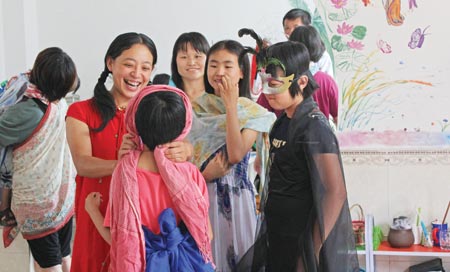An unconventional education
 |
|
Song Xiayan (second left) helps a girl dress up for a party in her home schooling community of Dali, Yunnan province. Photos Provided to China Daily |
 |
|
Kids wear life-saving jackets before going on a river rafting experience. |

Planting vegetables, cooking, fishing and dancing are part of the curriculum at a home-schooling system in a small community in Dali, Yunnan province. Zhang Yue reports.
Song Xiayan's self-introduction on a social networking site connected her with parents who share similar educational values. "I come from Guangdong province where people eat basically everything. Now, I eat only vegetables that I grow myself," Song writes on Douban, a social networking site popular among Chinese youths.
The 38-year-old started a popular online home schooling community.
Better known as "Super Vegetarian Mom" on the Internet, Song's main educational philosophy is letting children get close to nature and learning about what interests them most.
"Giving my daughter a happy childhood is what I think about most," says Song, who moved to Dali, Yunnan province, in 2010.
More than 20 families from various cities in China who are convinced of Song's "natural" education system, have migrated to Dali.
About half the families now live, work and study together on a 0.27-hectare plot of land, which also has a vegetarian restaurant; while the others live in other parts of Dali and commute to the community school daily.
Children in the community start their day working in the fields, followed by one or two hours of reading a book they like, and cooking lunch together. The kids also receive lessons, such as music, dancing and handicrafts. They go out fishing and hiking almost every week.
Song is not their only teacher. The children are also taught by their parents, university student-volunteers and local folk artists.
There is no fixed curriculum or homework.
"We are people who have escaped from the burden of a normal, traditional education system," Song says. "I want to give my daughter a happier, more cherished childhood. I don't care for degrees."
Before arriving in Yunnan, Song worked as a senior executive at a foreign enterprise, and her husband worked in a bank.
"We led a hectic life similar to most white-collar workers," Song says. "We didn't have time to smell the flowers."
What bothered Song most was that her daughter, Xixi, was experiencing an unhappy childhood because her worth was measured by her school achievements.
The 11-year-old changed schools twice because of a heavy workload and problems getting along with her classmates.
"I had bad relationships with my classmates," Xixi says. "They were not my classmates, they were my enemies."
"When she was in Grade Four, it was just endless homework," Song says. "The teachers asked them to copy articles umpteen times or to memorize texts by heart. My daughter rarely went to bed before 11 pm."
The girl became a loner.
"She became very quiet. Whenever I talked to her, she didn't pay attention and was easily distracted," says Song, who decided then that she needed to do something.
"I've been working for years and trained many young employees," she says. "Earning respect from people has little to do with academic degrees. A successful person is about integrity, personality, about how they lead their life. My daughter will not be a 'successful' person if she stays at a mainstream school."
Eager to find a creative way to educate her daughter, Song searched everywhere and found Namei Education Center, which was set up by Xiao Wangye in Dali. Xiao, a Sichuan native, started the center for children to learn through interactions with nature.
At the end of 2010, Song quit her job to join Xiao's center, along with her daughter. Upon arrival, Song's family was awe-struck by Dali's natural beauty. Song started blogging and uploading photos about life in Dali, which attracted like-minded parents.
She later set up a vegetarian restaurant and bought 0.27 hectares of land to experiment with organic farming. Her entrepreneurial efforts have evolved to become the main source of income for the community.
"Students study in the community while parents work here," Song says. "In that way, children are able to have their parents' company most of the time. This is important for their growth."
Her family's diet has also become healthier. Once a fan of hamburgers, Xixi now loves eating the broccoli, spinach and carrots they grow, while Song has become a vegetarian.
It took Xixi one year to recover from the nightmare of her previous school experiences. She is much happier now but still has nightmares about exams occasionally.
Last year, Xixi started to play the piano again, something she disliked before because her music teacher was more concerned about her passing piano exams than cultivating her interest in music. A year after they moved to Dali, Xixi suddenly played a song that she and her mother listen to every day in the supermarket.
"No words could express my happiness at that time," Song says.
Zhao Ming, a 41-year-old father learned about Song's home-schooling community on the Internet, and his family of three moved from Anhui province to Dali. Although his 4-year-old son, Zhao Lei, has yet to face pressure at school, he has a bad temper and tends to physically attack whoever criticizes him.
"He just cannot get along with people," Zhao Ming says.
"Song is incredibly patient with the kids. She never gets angry even when my son attacks her. We spend every day working in the fields together."
After six months, Zhao Lei is now a different boy - he cooks breakfast every day with his mother's help and loves spending time with his new friends.
"I plan to stay here until my son turns 18," Zhao Ming says. "Yes, he may not earn a degree. But he will know what he loves to do and his mission in life. He understands nature and will be able to support himself wherever he goes. I'm happy to let him make his own decision about how to lead his life. For me, this is more important than an academic degree."
According to Yang Dongping, head of the 21st Century Education Research Institute, a non-profit research institute focusing on education policy research, parents have the right to choose the way that their kids are educated as education is a basic right.
"Some parents figure out their own way of educating kids, because they find that traditional schooling cannot meet their children's developmental needs," he wrote on his blog recently. "I think this educating mode will become increasingly popular, and we should be more tolerant and supportive of home schooling," he adds.
Contact the writer at [email protected].






















